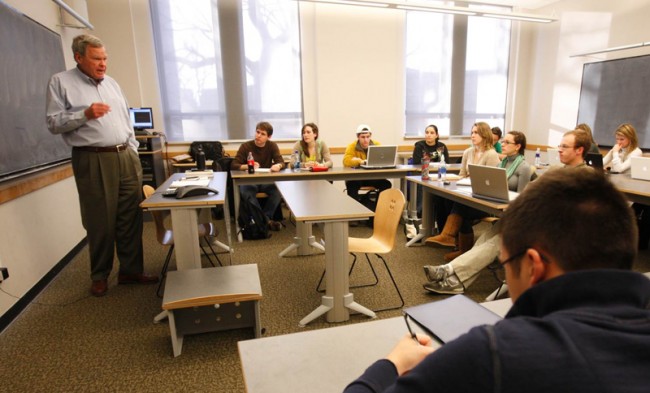Visit a Class This Spring
The start of the spring semester means a new round of textbook shopping, the start of conference basketball play, and, sadly, the final semester on campus for seniors. The fact that class is back in session also means new opportunities for prospective students to visit campus. Carolyn’s recent post on campus visit programs outlined options such as Black and Gold Days, the Daily Information Session and Campus Tour, and ‘Dore for a Day. Each one of these programs offers a different way to gain a new perspective on the Vanderbilt community.

But, did you know that prospective students also have the opportunity to sit in on a class at Vanderbilt? It’s true. Each semester, all four of Vanderbilt’s undergraduate colleges list courses that prospective students can visit – classes like “The Blues,” “Early Modern Political Philosophy,” and “Developmental Psychology.” As a chance to meet faculty, talk with current students, and experience the academics first-hand, class visits are an excellent way to learn more about Vanderbilt and get a feel for the campus.
Below is a sample of the courses that are available this spring. This is just a partial list of what is available. If you’re looking for something in particular that is not listed below or if you just want to browse the full list, visit the class visit page.
If you do visit a class this spring (or if you’ve visited in the past), let us know about it in the comment section. We’d love to hear about your visit to campus.
School of Engineering
BME 103. Biomedical Materials: Structure, Property and Applications. Structure-property relationships in both natural and synthetic, hard and soft materials. Bio-inspired materials design, the role of self-assembly in achieving highly ordered structures, material design and properties for emerging biomedical applications, factors influencing biocompatibility, performance of biomaterials in both soft and hard tissues, and biological response to implants.
CHBE-162-01. Chemical Engineering Thermodynamics. Application of the laws of thermodynamics to chemical engineering systems. Entropy balances and analysis of thermodynamic cycles. Methods of estimating thermodynamic properties of pure fluids and mixtures, including equations of state, to provide background for chemical process design and simulation.
CS-101-01. Programming and Problem Solving. An intensive introduction to algorithm development and problem solving on the computer. Structured problem definition, top down and modular algorithm design. Running, debugging, and testing programs. Program documentation.
EECE-116-01. Digital Logic. Numbering systems. Boolean algebra and combinational logic, graphical simplification, sequential logic, registers, and state machines.
Blair School of Music
MUSE-131-01. Jazz Ensemble: Big Band. Open by audition to all Vanderbilt students, this ensemble performs both traditional and modern jazz styles, including dance band, swing, contemporary, and charts currently under development. Improvisation, jazz timbres, and other idiomatic concepts explored through lecture-demonstration and performance. At least one concert is presented each semester.
MUSL-151-01. The Blues. Downhome, classic, Chicago, and urban blues-history, musical structure, musical styles, singers’ lives, and meanings of blues lyrics. The current blues revival, blues and tourism, race and revisionist blues scholarship, and the relation of blues to African American poetry and fiction. Artists such as Ma Rainey, Charley Patton, Robert Johnson, Lightnin’ Hopkins, Muddy Waters, B.B. King, Buddy Guy, Robert Cray. SPRING.
College of Arts & Science
ANTH-209-01. Global Wealth and Poverty. The production of inequality. How wealth is accumulated, lost, exchanged, and displayed; how poverty is created, endured, and overcome. Explanations in terms of luck, hard work, immorality, occult forces, and public policies. Case studies.
ASTR-102-01. Introductory Astronomy: Stars and Galaxies. Observed and physical properties of stars. Supernovae, neutron stars, and black holes. Our Milky Way galaxy and other galaxies. Cosmology, dark matter, dark energy, and the Big Bang.
BSCI-118-01 Green Earth: The Biodiversity and Evolution of Plants. Biodiversity of plants, their adaptations to the environment, and their evolutionary and ecological relationships. Basic biology of plant form and function and the importance of plants for life on Earth. Not intended for students planning to major in biological sciences. Three hours of lecture and one laboratory period per week.
HIST-209-01. Russia: Old Regime to Revolution. Russian history from the early nineteenth-century old regime through the Russian Revolution of 1917. Culture, society, and serfdom; the Great Reforms, ideology, and radicalism; industrialization; modernity in an agrarian society; twentieth-century revolutions.
PHIL-257-01. Early Modern Political Philosophy. A study of competing accounts of the best form of political association, which differ from Locke, through the works of Machiavelli, Hobbes, Spinoza, and Rousseau.
MGRL-190-01. Principles of Marketing. Creating customer value and building profitable customer relationships. Understanding customer needs, defining target markets, and crafting value propositions. Case studies.
ARTS-111-01. Printmaking I: Screen Printing and Lithography Introduction to printmaking media, including screen printing and lithography. Traditional and experimental approaches. Prerequisite: 102.
Peabody College of Education and Human Development
PSY-PC-1630-01. Developmental Psychology. An overview of human development emphasizing the period from conception through adolescence. Course content includes research methods as well as in-depth coverage of selected topics in cognitive, social, emotional, and physical development.
HOD-2720-03. Advanced Organizational Theory. A comprehensive study of current theories and applied research in organizational effectiveness. Emphasis is on the principles and practices of organizational restructuring, organizational development and planned changes, systems and processes, self-managed teams, and Total Quality. Experiential learning through simulations and field work will reinforce systematic inquiry, strategic planning, and applied organizational assessment skills. Prerequisite: HOD 1200.
PSY-PC-2310-01. Educational Psychology. Applications of psychological theories and research to classroom settings. Cognitive development, problem solving and critical thinking, learning theories, motivation, social contexts, individual differences, classroom issues, evaluation issues. Prerequisite: PSY-PC 1200/1207 or 1630 or PSY 101 .
